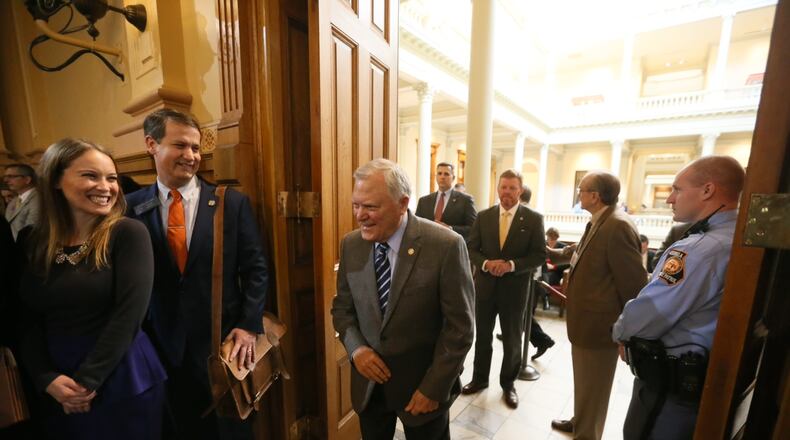With only two months to go before the start of the 2018 legislative session, the Deal administration is finding that propping up Georgia’s teacher pension system is making its job difficult as it seeks to write a balanced budget.
The administration had been warning for months that there wouldn't be a lot of extra money to spend next year.
But during a conference at Georgia State University, Teresa MacCartney, the governor’s budget director, made it clear the reason is a huge jump in payments to the teacher pension system.
“The (fiscal) 2019 budget is projecting revenue growth,” MacCartney said. “The reality is the largest single item you will see in the budget is pensions.”
She said Gov. Nathan Deal and lawmakers next year will need to add at least $351 million to the more than $1.5 billion the government already puts into the teacher pension system. And she said that figure might grow.
In a decent economy, state tax collections grow around $800 million to $950 million in a year.
“When I have to take at least $351 million off the table, you have a lot less flexibility to deal with other problems,” she said.
Such issues aren’t exclusive to Georgia.
“Pensions are a problem for a lot of our states,” said Alex Hathaway, a research associate at GSU’s Center for State and Local Finance.
States such as Illinois and New Jersey seem to be chronically in crisis over how to pay for underfunded pensions that they’ve promised workers and are obligated to pay. By comparison, Georgia lawmakers have traditionally met pension payments.
Still, Dennis Lockhart, a past president of the Federal Reserve Bank of Atlanta, said issues relating to aging baby boomers — such as pensions and elderly health care costs — will be a big issue that governments across the country will face for the next few decades.
Deal has been cautious about promising increased state spending in the past. Each summer his office tells state agencies not to expect more money, except in areas such as k-12 education, colleges and public health care, where enrollment is increasing.
With the Trump administration and federal government looking to cut spending, MacCartney said, officials from government-sponsored programs come to her asking whether the state will come up with more money to fill any gaps. She tells them all pretty much the same thing.
“We are not as a state able to backfill every federal program,” she said.
While they've tried to tamp down expectations in the past, they also haven't faced a pension tab like the one that will come due in fiscal 2019, which begins July 1.
Lawmakers raised the alarm earlier this year when they had to put an extra $223 million into the pension system for 400,000 teachers, university employees and retirees. By spring, pension officials were warning that they'd need $375 million to $400 million more in fiscal 2019.
The “employer,” or government, contribution rate into the Teacher Retirement System will have more than doubled since 2012 when the new rate takes effect next year.
The reasons are similar to those plaguing many public pension systems across the country. Investment returns dropped during the Great Recession and haven’t met expectations some years since then.
There are more Georgians drawing benefits from the system as baby boomers retire, plus fewer employees paying into the plan than there were before the recession because of job cuts or freezes.
The $71 billion Georgia system is funded through a combination of contributions from employees and employers (school districts, public colleges, state agencies, etc.), as well as investment income.
The pensions that teachers and employees receive are based on the highest income they earned over a period of time and the years they worked. While the number of Georgia retired university employees, teachers and state workers receiving pensions of more than $100,000 a year has more than doubled in the past six years, the vast majority of retirees get much less. The average is about $36,000.
Educators see the pension as one of the best recruiting tools the state has to attract and retain good teachers, and any attempt to change the system — the way lawmakers rewrote benefits for new state employees in the late 2000s — have been quickly beaten back. Still, it could be an issue down the road: One of the leading proponents of changing the system for newly hired teachers is former state Sen. Hunter Hill, a Republican candidate for governor.
About the Author
Keep Reading
The Latest
Featured




